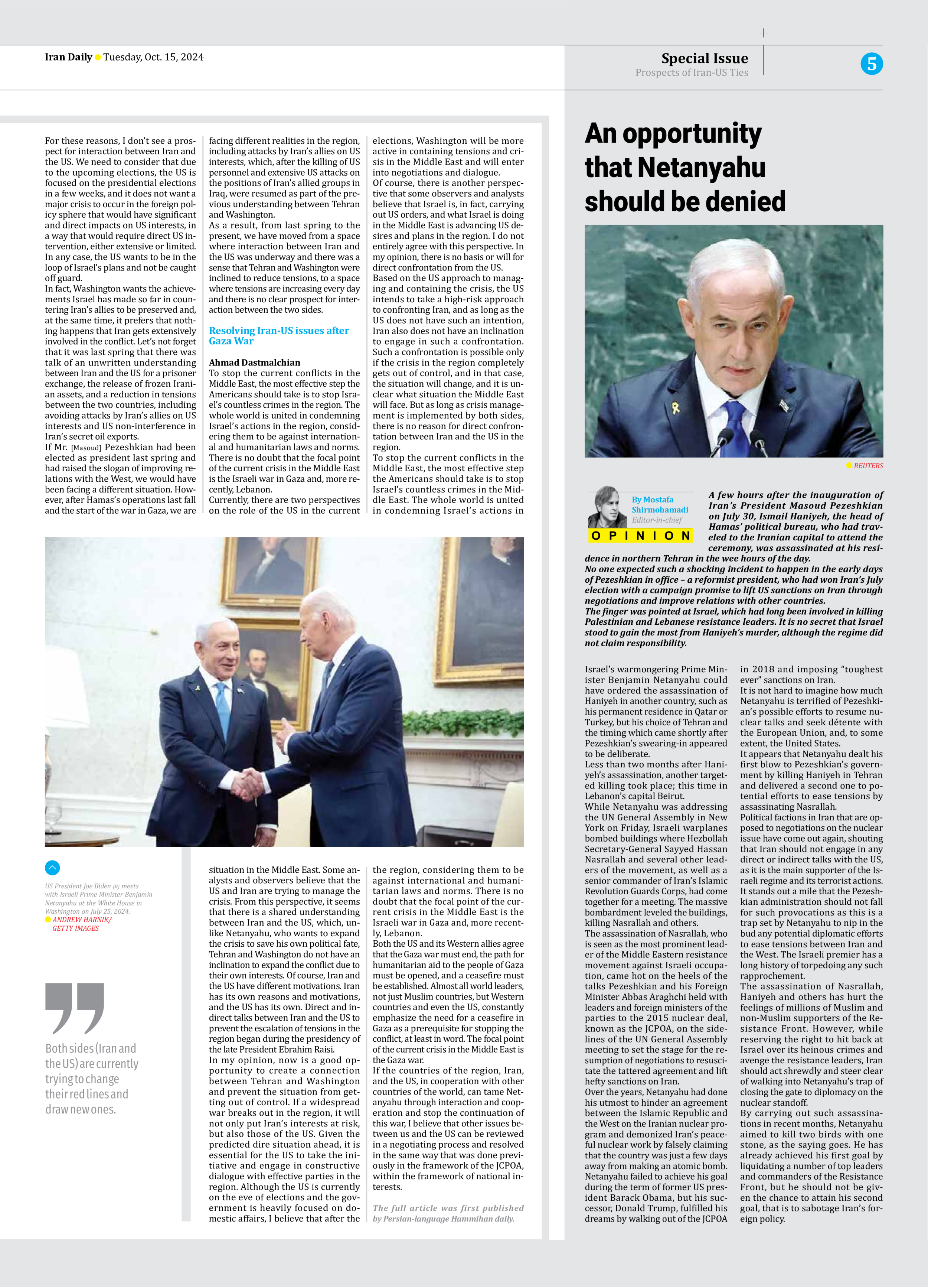
An opportunity that Netanyahu should be denied
A few hours after the inauguration of Iran’s President Masoud Pezeshkian on July 30, Ismail Haniyeh, the head of Hamas’ political bureau, who had traveled to the Iranian capital to attend the ceremony, was assassinated at his residence in northern Tehran in the wee hours of the day. No one expected such a shocking incident to happen in the early days of Pezeshkian in office – a reformist president, who had won Iran’s July election with a campaign promise to lift US sanctions on Iran through negotiations and improve relations with other countries. The finger was pointed at Israel, which had long been involved in killing Palestinian and Lebanese resistance leaders. It is no secret that Israel stood to gain the most from Haniyeh’s murder, although the regime did not claim responsibility.
By Mostafa Shirmohamadi
Editor-in-chief
Israel’s warmongering Prime Minister Benjamin Netanyahu could have ordered the assassination of Haniyeh in another country, such as his permanent residence in Qatar or Turkey, but his choice of Tehran and the timing which came shortly after Pezeshkian’s swearing-in appeared to be deliberate.
Less than two months after Haniyeh’s assassination, another targeted killing took place; this time in Lebanon’s capital Beirut.
While Netanyahu was addressing the UN General Assembly in New York on Friday, Israeli warplanes bombed buildings where Hezbollah Secretary-General Sayyed Hassan Nasrallah and several other leaders of the movement, as well as a senior commander of Iran’s Islamic Revolution Guards Corps, had come together for a meeting. The massive bombardment leveled the buildings, killing Nasrallah and others.
The assassination of Nasrallah, who is seen as the most prominent leader of the Middle Eastern resistance movement against Israeli occupation, came hot on the heels of the talks Pezeshkian and his Foreign Minister Abbas Araghchi held with leaders and foreign ministers of the parties to the 2015 nuclear deal, known as the JCPOA, on the sidelines of the UN General Assembly meeting to set the stage for the resumption of negotiations to resuscitate the tattered agreement and lift hefty sanctions on Iran.
Over the years, Netanyahu had done his utmost to hinder an agreement between the Islamic Republic and the West on the Iranian nuclear program and demonized Iran’s peaceful nuclear work by falsely claiming that the country was just a few days away from making an atomic bomb.
Netanyahu failed to achieve his goal during the term of former US president Barack Obama, but his successor, Donald Trump, fulfilled his dreams by walking out of the JCPOA in 2018 and imposing “toughest ever” sanctions on Iran.
It is not hard to imagine how much Netanyahu is terrified of Pezeshkian’s possible efforts to resume nuclear talks and seek détente with the European Union, and, to some extent, the United States.
It appears that Netanyahu dealt his first blow to Pezeshkian’s government by killing Haniyeh in Tehran and delivered a second one to potential efforts to ease tensions by assassinating Nasrallah.
Political factions in Iran that are opposed to negotiations on the nuclear issue have come out again, shouting that Iran should not engage in any direct or indirect talks with the US, as it is the main supporter of the Israeli regime and its terrorist actions.
It stands out a mile that the Pezeshkian administration should not fall for such provocations as this is a trap set by Netanyahu to nip in the bud any potential diplomatic efforts to ease tensions between Iran and the West. The Israeli premier has a long history of torpedoing any such rapprochement.
The assassination of Nasrallah, Haniyeh and others has hurt the feelings of millions of Muslim and non-Muslim supporters of the Resistance Front. However, while reserving the right to hit back at Israel over its heinous crimes and avenge the resistance leaders, Iran should act shrewdly and steer clear of walking into Netanyahu’s trap of closing the gate to diplomacy on the nuclear standoff.
By carrying out such assassinations in recent months, Netanyahu aimed to kill two birds with one stone, as the saying goes. He has already achieved his first goal by liquidating a number of top leaders and commanders of the Resistance Front, but he should not be given the chance to attain his second goal, that is to sabotage Iran’s foreign policy.







